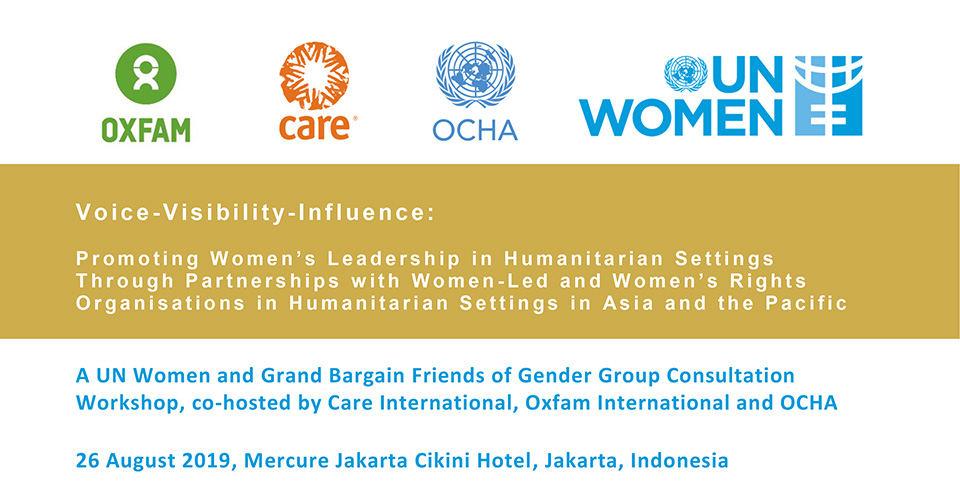
Voice-Visibility-Influence:

Event description
A UN Women and Grand Bargain Friends of Gender Group Consultation Workshop, co-hosted by Care International, Oxfam International and OCHA.
UN Women and the Grand Bargain Friends of Gender are organising a Consultation with women’s organisations, co- hosted by Care International, Oxfam International and OCHA. This Consultation workshop will take place in the Mercure Jakarta Cikini Hotel on 26 August 2019. The Consultation workshop takes place 1 day before the Asia Pacific Regional Conference on Localisation of Aid, led by IFRC and SDC (27 and 28 August, Jakarta).
More than 135.7 million people around the world need humanitarian assistance today. 1 The Asia-Pacific region accounts for 41 per cent of all disasters worldwide – and over 90 per cent of all global deaths from disasters – in the past decade.2 Available statistics in the region and globally show that women, girls and marginalised groups are more likely to die in disasters.
Yet women are not just victims in disasters and crises; they are also key agents of change. In the face of natural hazards, women bring invaluable contextual knowledge, skills, resources and experiences to disaster preparedness, response and resilience building, and their proven skills in community mobilisation positions them to be transformational agents in emergency preparedness and building resilience.3 Women are often the first responders to a crisis and play a central role in the survival and resilience of families and communities. Local women’s groups are often best placed to mobilise change, identify solutions and respond to crises. Women’s leadership is seen as key in promoting transformative change, resilience and social cohesion in humanitarian settings.
The role of the civil society and, in particular, local women’s organisations is life-saving, critical to ensure an appropriate, effective and sustainable response to crises and to pave the way to self-reliance, recovery and resilience of women and girls and crisis affected populations more broadly. As an urgent matter both of principle and effectiveness, humanitarian efforts must recognise the rights, roles and agency of women and girls. Furthermore, a specific focus needs to be put on the intersectionality of multiple forms of discrimination that can drastically intensify marginalisation of women and girls, including disability, ethnicity, age, and sexual orientation among others, in order to effectively achieve UN’s commitment to ‘leave no-one behind’.
Despite their critical contributions, women and girls are often excluded from decision-making processes that shape response strategies to crises and disasters. Challenges continue to persist in promoting equality and achieving meaningful participation of women and girls in decision-making processes and leadership structures. Funding for local responders remains limited, and even where overall humanitarian funding for national and local actors has increased, it is often still channelled to gender-blind or male-dominated actors in the country, rather than translating to better resourcing for women’s groups and organisations.4 Such streaming of national and local funding, far from meeting the goals of the WHS and Agenda 2030 commitments to leave no one behind, can instead reinforce marginalisation and exclusion of women and girls from the decisions on humanitarian aid that affect their lives.5 Furthermore, despite recent increases, the total bilateral aid allocated to programmes with the primary objective of targeting gender equality and the empowerment of women in conflict-affected countries remains low, at 5 per cent of total bilateral aid to such countries according to the 2018 SG’s Report on Women, Peace and Security.